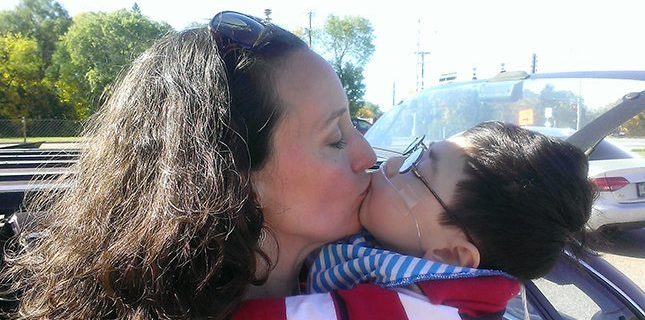Palliative WHO? The Sherpas Who Help Us Navigate My Son’s Diagnosis of Uncertainty

While palliative can be a word heard frequently in the medical field, it’s one that is often misunderstood and unnecessarily concerning for parents. Today we invite you to read the second of a series of blogs from Dannell Shu, who writes a blog at MamaShu.org where she contemplates family life within the world of pediatric palliative care. She invites you to follow along. Read the first part of her series where she discusses what palliative care is.
My son is a one of a kind. He has a unique spirit and constellation of medical complexities. He has a unique God-given purpose in life.
As his Mama, I am saturated by the nuances of his medical care and how these have shifted over time. My knowledge of his history is extensive. I do my best to monitor and assess how the nuances are changing within each day.

Credit: SummerStreetPhotography.com
My vision for his future is usually realistic and always exceptionally hopeful. I am his Mama after all.
In truth, I have no genuine understanding of what lies ahead.
- How his neurological condition will change with time, growth, and age?
- How his spastic cerebral palsy will progress?
- What it is that allows him to defy all medical reason for how he has lived this long, given his fragile respiratory system?
What I do know is that along with my son’s constellation of medical complexities has come the diagnosis of Uncertainty.
Uncertainty’s Sherpas
Uncertainty is a series of steep mountains, treacherous valleys, and occasional quiet waters. Terrain that, before the birth of my son, I didn’t even know existed, let alone how to navigate it.
 Merriam Webster defines a Sherpa as someone who is “known for providing support for foreign trekkers and mountain climbers.” (1) They are essential to the ascents of foreigners within various mountains of the Himalayas (2).
Merriam Webster defines a Sherpa as someone who is “known for providing support for foreign trekkers and mountain climbers.” (1) They are essential to the ascents of foreigners within various mountains of the Himalayas (2).
In the diagnosis of Uncertainty, I am a foreigner faced with climbing mountains of medical complexities. Our Pediatric Palliative Care Team are our Sherpas.
They have gone before us many times with many children. They know the terrain well and are skilled guides. They can ask meaningful questions to help me find the path that is best for our family. They can synthesize the unique aspects of my son with the known aspects of his various diagnosis.
A Team of Support for Foreigners
Pediatric Palliative Care teams exist within hospital, clinic, and community settings. They are led by a palliative physician with extensive pediatric experience. Nurses, Social Workers, and Chaplains are key members, all of whom work collaboratively with families. In some contexts teams can extend to include Music Therapists, Volunteers, Massage Therapists, Nurse Practitioners, Pharmacists, Child-Life Specialists, and more. They are an interdisciplinary team of Sherpas who are skilled at helping families articulate their values, make respective medical decisions, ease suffering, and discover in each section of the climb how to “be a family” within this journey.
In the following video, during the first 7:45 minutes, Dr Joanne Wolfe of the Dana-Farber Cancer Institute talks about the definition of palliative care, differentiates it from hospice care, and talks about the various members of the palliative care team.
One of the beautiful aspects of pediatric palliative teams is they take on many forms in many contexts. As Jody Charatek, a pediatric palliative nurse with Fairview Home Care says “When you have seen one pediatric palliative care program… you have seen ONE pediatric palliative care program! Different programs for different needs.” (3)
The Minnesota Network of Hospice and Palliative Care (MNHPC) has developed the first directory of palliative care providers in Minnesota. They have been wise to identify programs that provide some level of pediatric palliative support. This directory is a great way to connect families like ours to the palliative services available within our communities.
As a parent, if you are looking to connect with other families who have been supported by palliative care, I recommend you seek out the Courageous Parents Network. Their website has been designed to be a place where you can find wisdom from fellow parents who understand, as well as resources developed by experts to help you cope and get through each moment.
My son’s team of palliative Sherpas have been critical in helping my family navigate the treacherous terrain of Uncertainty. They are the first ones I call when he is showing signs of stress that I am not able to alleviate. When the emotional and spiritual strains of Uncertainty cloud my ability to make difficult medical decisions, they are a trusted compassionate presence, guiding me toward quiet waters. Our palliative Sherpas respect the unique characteristics of my son and guide us along a path, encouraging us to savor the unique vistas along the way.
In-article citations
- M-W.com
- https://www.britannica.com/topic/Sherpa-people
- Joan “Jody” Chrastek, RN, DNP, CHPN, “Starting (or Jump Starting) A Pediatric Palliative Care Program: Some Tips and One Team’s Experience” Children’s Project on Palliative/ Hospice Services 41 (2015): p14, http://www.nhpco.org/sites/default/files/public/ChiPPS/ChiPPS_ejournal_Issue-41.pdf


